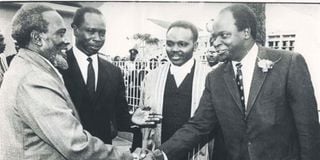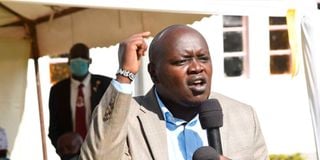Kenyattas, Mois and the history of death tax — who said we can’t tax the dead?

Former Presidents Jomo Kenyatta, Daniel Moi and Mwai Kibaki with the first African Clerk of the National Assembly, Mr Leonard James Ngugi.
One of the enduring legacies of the obscure Joseph Kamere — when he was our Attorney-General — was his handling of the death tax.
There has been some excitement this past week after Nandi Senator Samson Cherargei fished out the Estate Duty Act, which expressly states that the late Presidents Jomo Kenyatta and Daniel arap Moi are exempted from its provisions.
That also caught my attention, for individual names are rarely sneaked into the law.
The United Democratic Alliance senator posted on Twitter letters he had supposedly sent to the Clerk of the Senate on his intention to amend that section to have the Kenyatta and Moi families pay taxes.
One confusion I have seen is that some people think estate duty is similar to land rates. It is not. For people to understand it, this estate duty was an inheritance tax, and it was paid by the living and not the dead.
The idea was that if you inherited property from a deceased person, there was an amount under schedule 1 to be paid to the state from the estate. It was known as death duty.
The story behind the Estate Duty tax is quite interesting. Every year, the government collected some Sh36 million under that tax category. But what surprised me is not the provisions of the Estate Duty but that our lawmakers – starting with Senator Cherargei — do not understand the laws of this country.
Either the Kenyan political space is full of mischievous clowns — who treat us to a free circus — or we have become brave consumers of whatever comes.
Before I disappoint those who thought they had finally found a noose on which to hang the Moi and Kenyatta families — and I am not holding brief for them — let me state that the Estate Duty Act should be read together with The Estate Duty (Abolition) Act of 1982, which essentially exempted everyone from paying Estate Duty.
Shortest Act
This two-paragraph law, the shortest Act in Kenya, was assented to on June 25, 1982, and commenced on June 28, 1982.
It states that “notwithstanding the provisions of the Estate Duty Act, no estate duty shall be levied or paid on property which passes on the death of any person dying on or after January 1, 1982”.
That means that even if we strike the names of Jomo Kenyatta and Daniel arap Moi from the Estate Duty Act, as Senator Cherargei wants, their estates will still not pay a coin since the death duty was abolished in 1982.
The only way to have them pay in the future is to repeal the Estate Duty (Abolition) Act of 1982 — and also amend Section 7 as Senator Cherargei proposes.
By doing so, the government would be reintroducing the death duty, and every Kenyan will pay, including the Kenyattas and Mois of this country. At this moment, talk of Estate Duty is immaterial since this is a non-existent tax under the law.

Nandi Senator Samson Cherargei. By setting himself on a mission to get the Kenyatta/Moi family to pay this tax, Mr Cherargei is actually helping to introduce a new tax.
Previously, when a person died, and before a death certificate was issued to his beneficiaries so that they could get the certificate of administration of his estate, the family had to pay the death duty. That is what was removed from the Act, and the other provisions of the administration of the estate were left intact.
“This particular Bill cuts away what the state was taking from the deceased person’s estates,” said Mr Kamere.
If this is what Senator Cherargei is after, it will be an exciting development.
While moving the Bill on that law, Attorney-General Joseph Kamau said that a deceased person’s beneficiaries were being burdened with a death tax even when the deceased had other liabilities.
“It was on this basis that the (Kanu) party decided that it was time to abolish the death duty.”
Mr Kamere was invoking the party because this was the first Bill brought to the House after Kanu became the de jure party on June 9, 1982.
And as Cabinet minister for Lands, Settlement and Physical Planning G.G. Kariuki told the House, the MPs had little to say on the Bill since “Kenya imeamua. It is not for us to argue but that is the duty of the party and the party has argued and accepted that this Bill be accepted; it is mandatory that when the party has agreed, we, therefore, accept it like that. It is a mandatory decision by the party and no one of us is capable to question the decision of the party.”
The other reason for abolishing the estate duty was that the government was taxing the bereaved “who actually need our support. They do not need to be taxed,” said Joshua Angatia, an assistant minister for Economic Planning and Development.
Noble act
That is how the Estate Duty (Abolition) Act was introduced. The thinking was noble.
“This is one of the biggest problems we have had since independence because we have accepted a number of laws” that are not culturally appropriate, according to Mr Kariuki, then a powerful insider of the Nyayo regime.
The Estate Act is an old English law that dates back to 1894 to govern the conflicting regime of taxes that governed the inheritance of estate in England. But in Kenya, it was first introduced in 1918.
Somebody asked why Kenyatta and Moi were exempted. In most commonwealth countries, most of the laws inherited from colonial rule passed any exemption given to the Queen to the Head of State. That is how Moi and Kenyatta’s names were introduced into the Estate Duty Act. It is a very controversial law.
Last month, there was uproar in the UK after it emerged that King Charles would not pay tax on inheritance. The uproar was because regular persons pay the standard inheritance tax of any estate that is above the value of $374,000. In British law, apart from the royal family, only the spouse or charity is exempted from paying the death tax.
The monarch was also not legally liable to pay income tax since it embodied the sovereign.
However, in 1992, the late Queen Elizabeth II agreed to pay a voluntary tax on the income she received as Duke of Lancaster.
Back in Kenya, the minister for Finance had powers to exempt an estate from the provisions of the Act.
But that was before that tax was abolished. How Senator Cherargei will navigate that law is not clear. Either he has never heard of the Estate Duty (Abolition) Act or he decided to entertain us.
It is upon Kenyans to decide whether they want to reinstate the estate duty, and finally, have the estate of Jomo Kenyatta and Moi pay the taxes.
By setting himself on a mission to get the Kenyatta/Moi family to pay this tax, Mr Cherargei is actually helping to introduce a new tax.
Who said we cannot tax the dead?
**
Postscript: Meanwhile, congratulations to Deputy President Rigathi Gachagua after the Court of Appeal ruled that you are a genuine spotless tenderpreneur, and ordered the Sh200 million forfeited to the State to be handed back.
Even the Asset Recovery Authority (ARA), which had won a case against you, fought hard to save your money and reputation. ARA has lived to its new reputation as an asset recovery authority. It helped our DP recover his money from the State, and they filed a solid affidavit arguing that they were misled to win the case. Well done ARA
May you continue to stand with the oppressed of the Uhuru regime. The honourable men and women who had bogus charges brought on them and had their properties seized through the courts should also be helped.
[email protected] @johnkamau1





